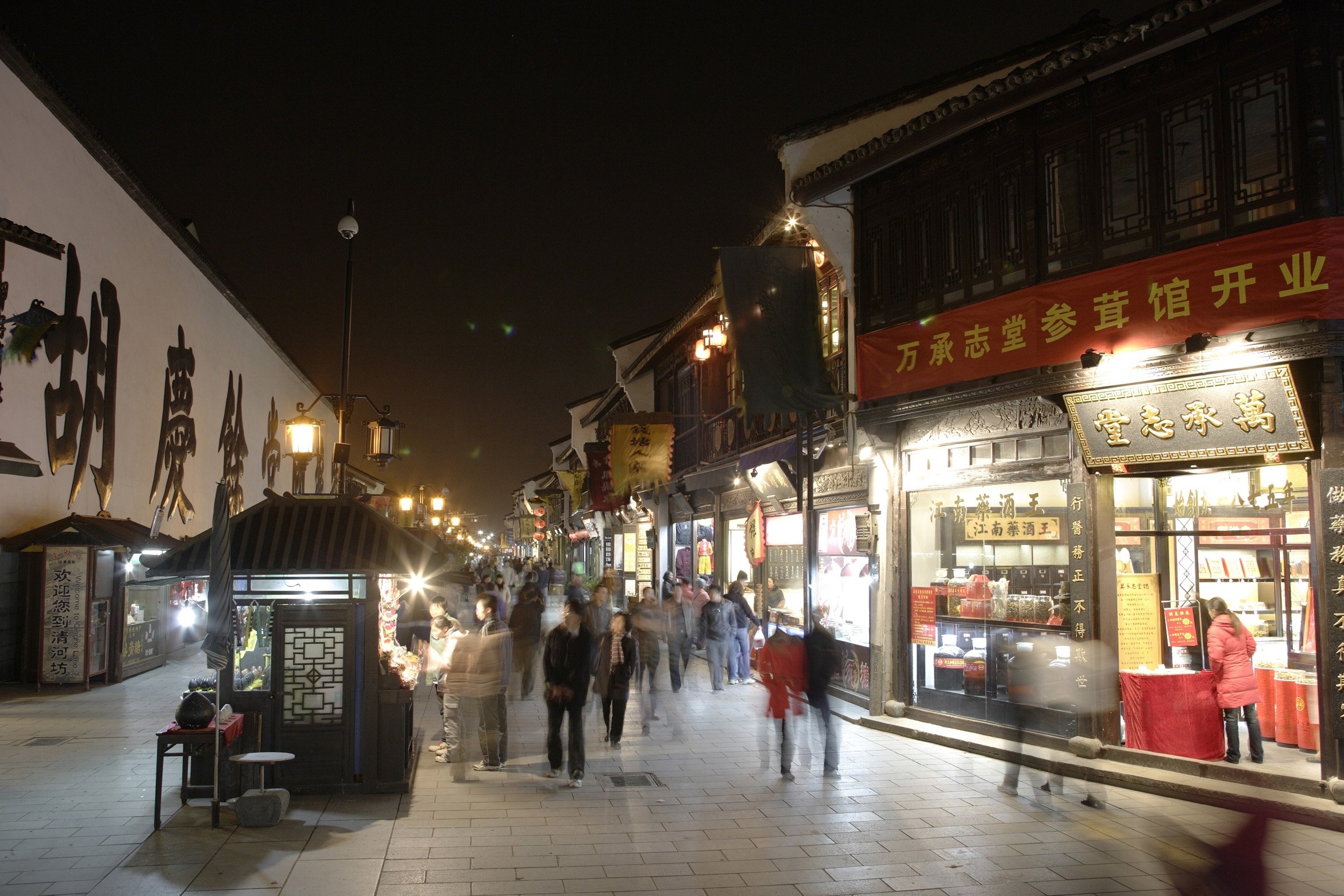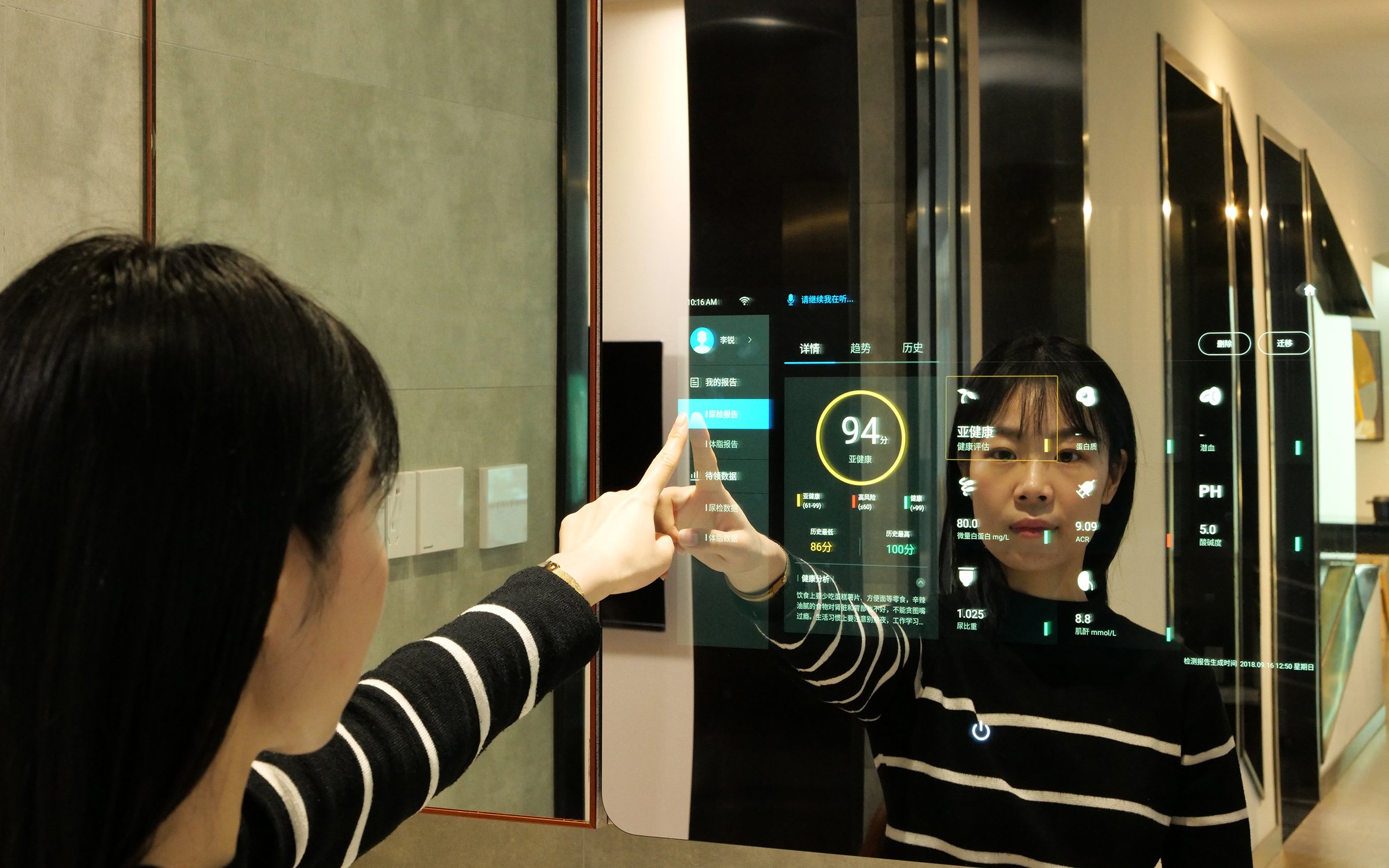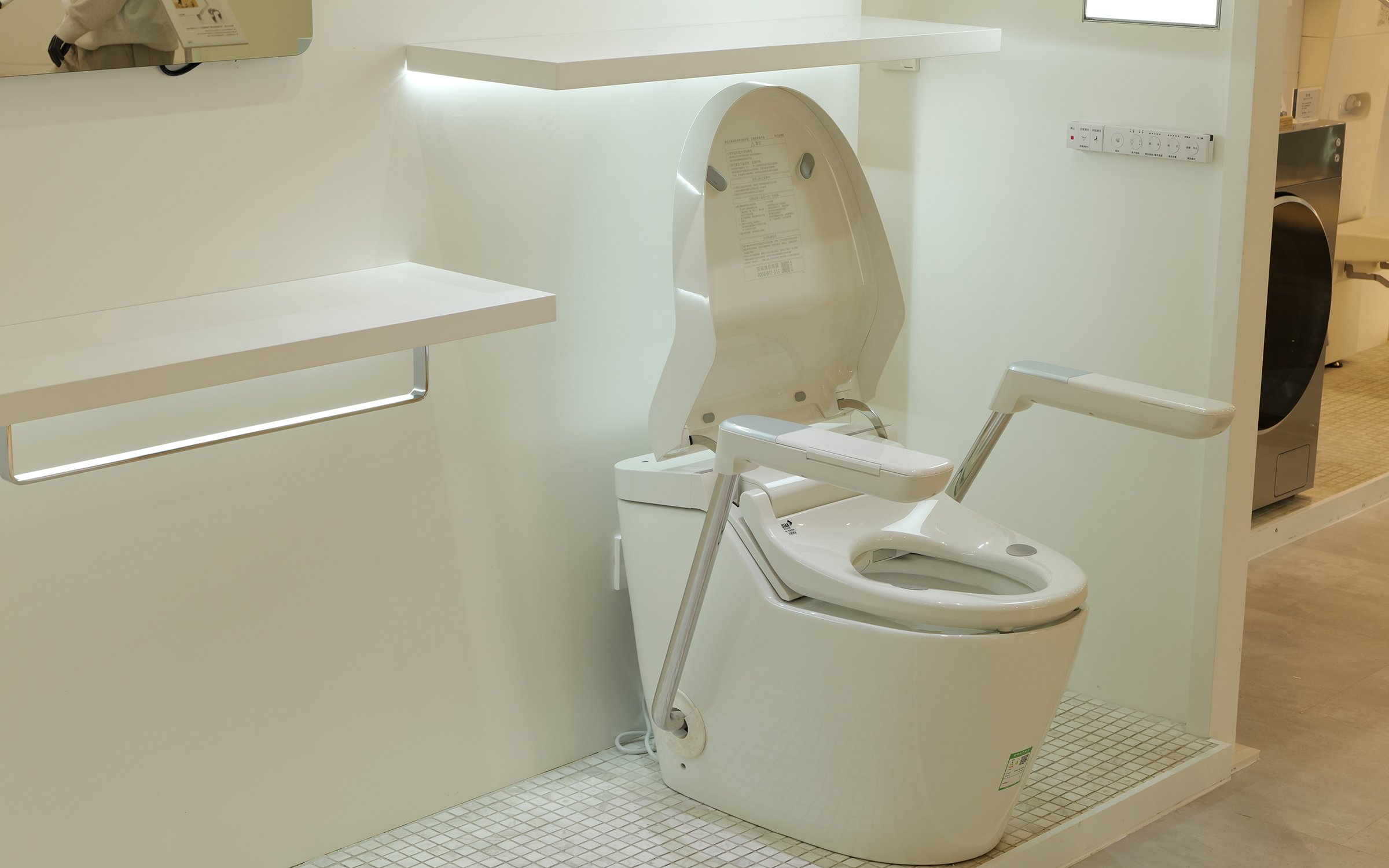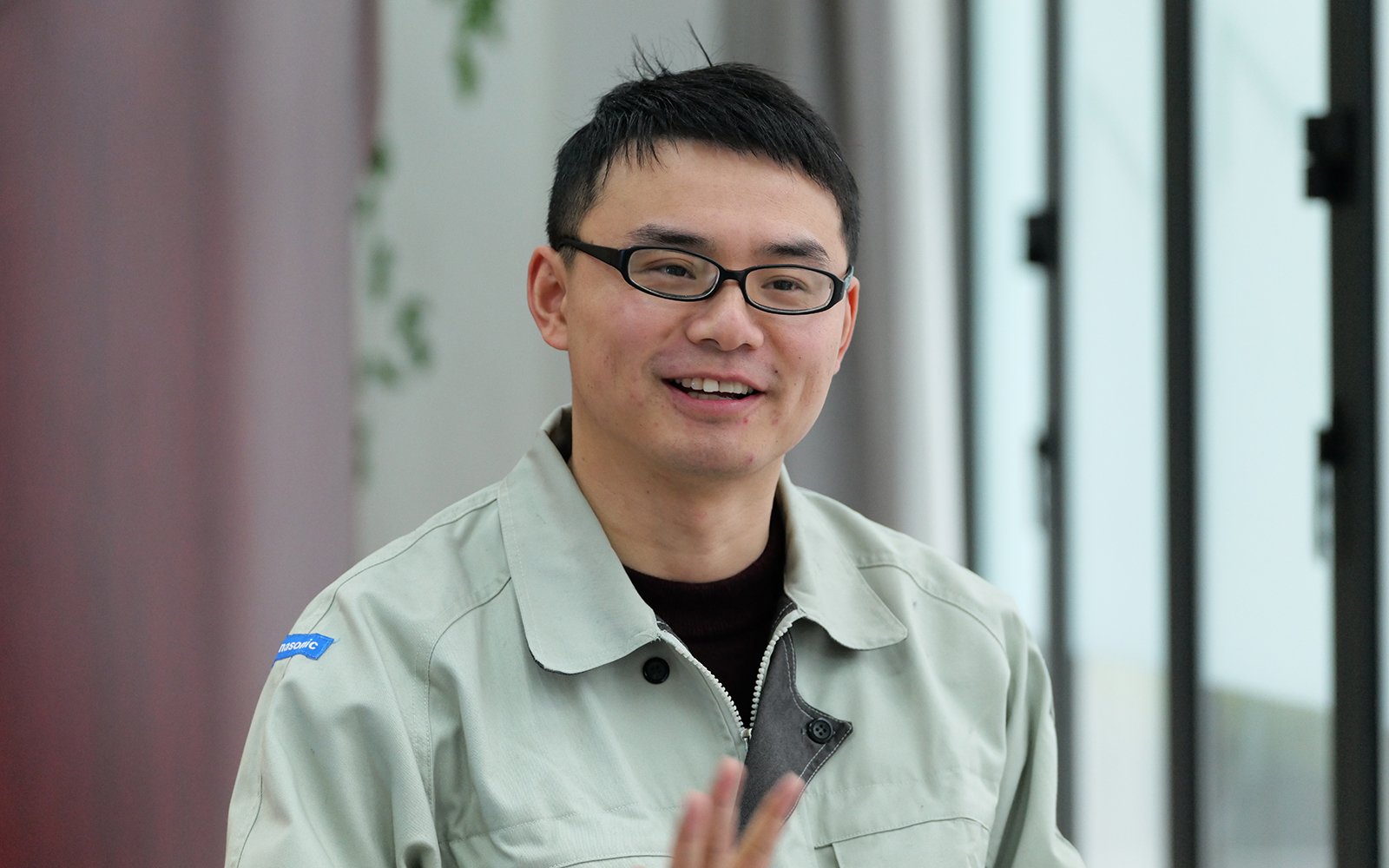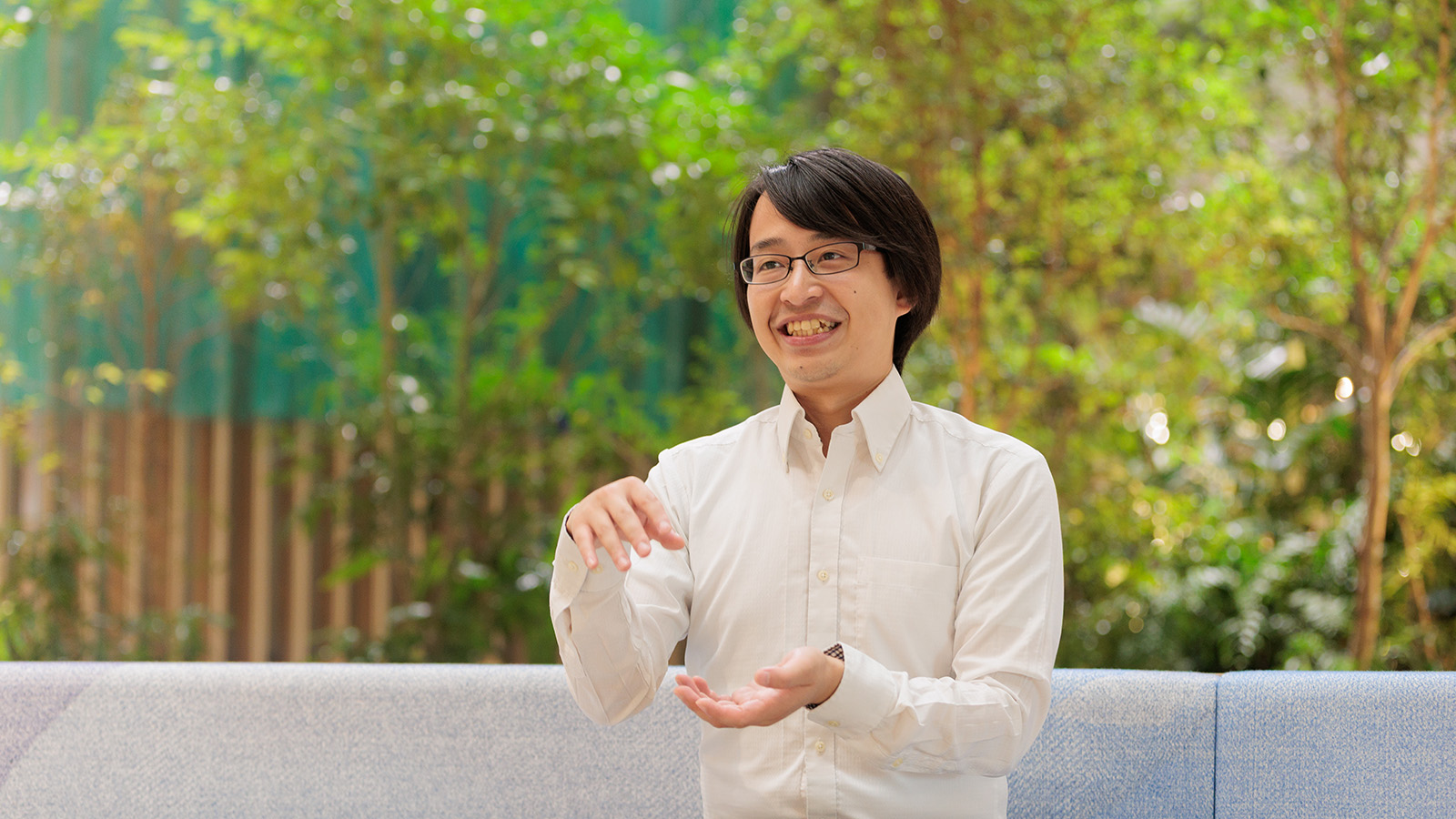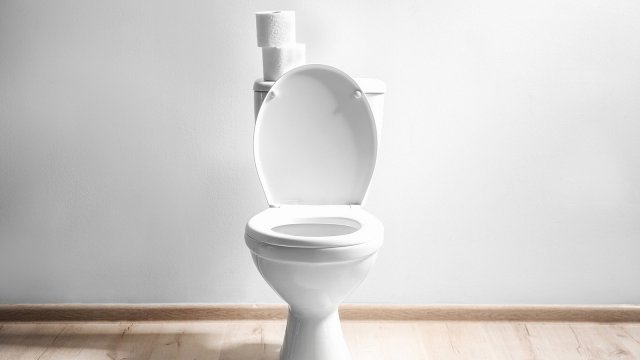
Public health in China has improved in the recent years, and as a result, people's awareness for health has increased. Nonetheless, people tend to avoid hospitals as they are chronically crowded and so their illness often becomes severe. The development team in Hangzhou, Zhejiang Province, where Panasonic's manufacturing site is located, wanted to develop a product that could prevent illnesses, that could help resolve this social issue. Taking advantage of China's unique environment, where 5G communication infrastructure is being implemented and young and old, women and men alike effortlessly use IoT, and with the help of a start-up in the medical industry, the team developed a toilet that lets people monitor their health simply by sitting on the toilet. The data can also be displayed on the bathroom mirror named "Magic Mirror." This is the story about how this product came to life.
Summary
- Panasonic developed an IoT health toilet for the Chinese market that measures people's body fat percentage and analyzes their urine. All they have to do is simply take a seat.
- In order to avoid crowded hospitals, people in China tend to refrain from visiting hospitals until their symptoms worsen. Panasonic developed this product to help address this social issue.
- The data gathered can be viewed on the smartphone app and also be sent and displayed on the bathroom mirror. This near future product was founded on China's well-developed IoT infrastructure, e.g. 5G.
Hospitals are crowded even in "heaven on earth"
Hangzhou, the capital of the Zhejiang Province.
In the center of the city lies Lake Xihu, a beautiful, alluring lake brimming with water, surrounded by a sylvan forest and shrouded in mist. Residents there enjoy relaxing while drinking the local green tea, longjing tea. It is as though a world depicted in an ink brush painting has come to life. From long ago, people of China have described this city with the following phrase, "There is heaven above, and Suzhou and Hangzhou below." Till this day, tourists flock from all across China throughout the year to get a glimpse of this city of dreams.
Hangzhou is also known as the headquarters of Alibaba, the largest IT company in China, and with a population of 9.8 million, it is also one of the nation's top cities with respect to finance and industry. The per capita GDP in 2019 was USD 22,000, so the city's economic power is already on par with that of developed countries.
From long ago, Hangzhou has been esteemed as a "city as beautiful as heaven," but some aspects of life in Hangzhou is far from heavenly. As is the case with other cities in China, it takes a lot of time and effort to receive healthcare at hospitals.
There is a phrase in Chinese that goes--"排隊3個小時、看病3分鐘." It means, even if you wait in line for three hours, the doctor will only see you for three minutes." But three hours is not bad considering there are people who bring blankets and sleeping bags to spend the night waiting in line outside the hospital. And social media is filled with videos of frustrated people fighting one another as they wait in line.
There are also people who profit off of crowded hospitals, and they are aggravating the situation. Reservation tickets for medical exams usually cost a few dozen yuan (1 yuan = approximately 16 yen), 200 yuan at most at famous hospitals, but hospital staff hand them off to scalpers, who sell them for five times the original amount, even 10 times if the tickets are for large, popular hospitals. Consequently, people who earnestly wait in line have an even harder time getting access to medical care.
But sometimes, innovative products are born from ingenuity, from the desire to climb out of and resolve terrible, agonizing circumstances.
"Can we not make something to help improve the situation?" Panasonic's development team in Hangzhou started to put their heads together back in 2014 while the scalping of hospital reservation tickets was escalating into a social issue.
This is where it all began, where the team eventually came up with a near future IoT toilet, the kind that you see in SF films, that measures people's body fat percentage and analyzes their urine. All they had to do was take a seat, and the results instantly show up on the Digital Mirror enabling people to keep track of their health. This is not merely a concept. This product is already available in the market.
"You have to wait long hours and the tests are cumbersome, so in China you have to be prepared to spend a whole day at the hospital. Having said that, examinations are not thorough. That is why if they only have minor symptoms, people would rather stay home and take over-the-counter drugs. But by continuing to do so, their symptoms become more severe, so many people in China have to either go in for surgery or spend an extended period of time in hospitals. If people could monitor their health and keep track of the test values at home, they would be able to nip illnesses in the bud. We wanted to create a product that can help Chinese people stay healthy. That is the underlying idea for the IoT toilet," said Wang Yinhui, the person in charge of development of advanced technologies.
Binge shopping changed people's awareness for toilets
In 2014, when the team started developing the IoT toilet, consumption by inbound tourists from China and other countries was becoming prevalent in Japan. And in 2015, the term "Bakugai (binge shopping)" created to refer to the ravenous shopping appetite of many Chinese travelers became so popular, it was selected as the buzzword of the year. One of the products that they binge shopped for was bidet-toilets.
During their stay in Japan, Chinese tourists experienced bidet-toilets in their hotels, department stores, etc. Having gotten used to the comfort, they bought theses toilets, took them home, and the reputation of these toilets spread across cities in China. The bidet-toilets Panasonic manufactures and sells in China, the "Beauty Toilet" are well reputed for their high performance and after service. Panasonic is a trailblazer in this category with their toilets boasting 1% of the market share in China.
As bidet-toilets became more and more widespread, the importance of toilets changed from simply being a "place where you relieve yourself" to a "comfortable environment." Mr. Wang and his development team, who have continued to think about how to revolutionize the product, thoroughly and repeatedly analyzed people's movements in bathrooms. And one day, they realized that one action was very important in ensuring that toilets also become an "environment that can prevent illnesses." That is, "everyone, without exception, pulls their pants down before they sit on the toilet seat."
"Generally, Chinese people have a high health awareness. That is why they purchase various medical equipment and health appliances. But most of the time, they use it once and store it away," noted Mr. Wang.
Why do people stop using these devices? "It is because tests can be tedious. Before they even take the tests, people have to, for example, 'take their top, pants, and socks off.' But people always pull their pants down when they use the toilet. If we could tie this in with taking health measurements, we thought we could encourage people to routinely take tests and make the tests less cumbersome," explained Mr. Wang.
So, in 2014 Panasonic began developing toilets that could measure body fat. Then they also wanted to integrate a urine test, but this posed a challenge. How to meet the standards set by the national government for urine tests conducted by the medical sector.
"We have experience and technology in toiletry that we have cultivated through the development of toilets. But we neither had expertise nor technology with respect to urine tests, and it would take too much time and money to start from scratch. That is why we decided to look for a partner with experience in wellness," explained Shen Kangshuai, the person in charge of product planning.
That is when they met, HIPEE, a urine test device manufacturer based out of Tianjin.
Panasonic's "serious" image changed
According to He Xin, "Our parent company, FRUITECH was established in 2006. We specialize in Health IoT (HIoT), which utilizes data to help consumers stay heathy. Urine test devices used to be the size of espresso machines, but we developed a very handy one that is the size of a thermometer and enabled users to check and manage the data on their smartphone apps. Of course, it can be used on its own, but by incorporating it with Panasonic's toilets, its potential has broadened significantly."
This is how these two companies began collaborating in 2016 to develop an IoT toilet. When asked if there were any challenges working together, the Panasonic teams all agreed that there were no difficulties per se, but Mr. He said jokingly, "We found it somewhat challenging.
"Naturally big companies like Panasonic have their own standards. But when working in the Chinese market, it is essential to respond with speed. We are a young company founded in 2014, so speed is not an issue for us. At the same time, we do not have much stamina, so if we do not act quickly, we would go bankrupt. Whereas Panasonic sweats the details to put it mildly. So, it was quite difficult to get use to that. Since Panasonic was known for its high quality, we had imagined that they would pay a lot of attention to detail, but when we started working together, we discovered that their devotion to detail went far surpassed our expectations (laugh)."
But by working with a large company like Panasonic, developing products through the process of trial and error, "Our image of Panasonic and Japanese companies changed," noted Mr. He.
"It is probably not an exaggeration to say that every single person in China, that is 1.4 billion people have used Panasonic products at least once in their lives. So 'Matsushita' is a very well-known brand in China. But in recent years, because it has history in the market, people have started to see the brand as being a bit old fashioned and too serious."
In fact, over the last decade, products developed by local consumer electronics manufacturers, who have drawn on their home advantage to thoroughly research and analyze the needs of consumers in the Chinese market, have become increasingly popular. There was a time when Chinese people ran to stores with wads of yuan in their hands to buy Panasonic products, for example, large screen "Gao" TVs that were also popular back then in Japan. Although Japanese products were respected for their technology, over the past few decades Japanese manufacturers often simply brought over popular products from Japan or used inferior designs and parts to bring prices down, so mass retailers of consumer electronics criticized such products and described them as unsellable. The situation was quite challenging, and this is consistent with the image of being "too serious" and "old fashioned" that Mr. He mentioned.
However, according to Mr. He, "Over the past few years, Panasonic products have become more aligned with Chinese consumers' tastes. And this is easier said than done. You need to invest a substantial amount of a wide range of resources in China to be able to do so."
Citizens open to integration of telecommunication infrastructure and IoT
This project was driven by the social mission to prevent illnesses aggravated by crowds at hospitals. The idea for the toilet dawned on them when they realized that everyone pulls their pants down when going to the bathroom, and the product was built on the experience and technologies in consumer electronics and toiletry cultivated over the years and undertaken with partners who complemented shortcomings. But all of this was not yet enough to create an environment for connecting the toilet to the network and making them widespread. It is important to note that Panasonic's IoT toilets have come to life also because of the openness of the people of China to accept IoT as part of their lives despite the fact that a few years ago there was not even a trace of it, and the aggressive implementation of high-speed, large capacity data communication infrastructure, e.g. the commercialization of 5G, undertaken by the Chinese government.
"Even my mother, who is in her sixties, regularly uses 'Alipay' QR code payment and has no qualms about using it. Even four-year-olds are rampantly using smart speakers. IoT is a part of many aspects of our lives in China, be it our homes, public spaces, transportation, etc." said Mr. Wang. And according to Mr. Yuan from the Contract Development Division, "For Chinese people it is natural to use IoT if it is available. This disposition dramatically helped the commercialization of IoT toilets."
And finally, in 2017, Panasonic unveiled the IoT toilet "DL-PL40CWS," first smart bidet toilet equipped with a body fat measurement device. Then in 2018, Panasonic launched the smart bidet toilet with health monitoring capability, the "CH2385WSC" equipped with a urine test, individual identification capability with fingerprint authentication, and the ability to communicate with the Magic Mirror. The urine test on the second iteration could measure six contents--protein, uric blood, urinary microalbumin, PH, urine density, and urinary creatinine, while the body fat measurement device also measures six items--body fat percentage, basal metabolic rate, bone mass, BMI, visceral fat, and muscle mass. The levels are immediately sent to the smartphone app, and if you call out to the Magic Mirror, "Nihao, Pana," the data will be displayed on the mirror letting you check on your health while you get ready in the morning.
Being a rather high-end, relatively expensive product, "At the moment, these products are mainly being taken up by BtoB clients including nursing care facilities and real-estate developers. But ultimately, we hope to grow in the BtoC market," explained Mr. Shen. As part of its efforts to grow in the BtoC market, Panasonic has employed influencer, Li Jiaqi, who is so popular he boasts an annual income of 15 million yuan, to do a live broadcast of the product on the EC site, Taobao.
Furthermore, Panasonic has created an exhibition space called "Aspirational Lifestyle House" within the Panasonic factory premises in Hangzhou, the development and manufacturing center for IoT toilets, to give people a glimpse of what Panasonic homes and home appliances may look like in the near future. Inside, Panasonic is showcasing a wide range of IoT connected smart appliances including the IoT toilet, the Magic Mirror, as well as the transparent OLED TV which turns transparent showing the background when not in use, and the smart refrigerator that shows what vegetables, meat, fruit, beverages etc. you have on the screen on the door, and even lets you order foods you are running low on right on the same screen.
IoT products including toilets are also on display in Panasonic's flagship store, the Panasonic Center located in a famous shopping area in central Hangzhou to appeal to consumers.
Panasonic is working on the next iteration of the IoT toilet, which will be equipped with other capabilities including an ECG based off of its partner, HIPEE's product. In the future, Mr. Wang would like to "Spare people the hassle of having to take the urine test device out of the armrest, hold it while you relieve yourself, and wash it before you put it back by integrating the urine test device with the toilet."
Mr. Zhang, who is the leader of the development team emphasized, "Whatever the case may be, consumers and the market are what is important. Everything starts from there." Mr. Wang then added, "What underpins that is our mission to create a product that will contribute to the health of people in China. The desire to understand consumers and place them first."
- Reproduced from the website "Mirai-kotohajime," by courtesy of Nikkei Business Publications, Inc.
# # #
- Disclaimer:
- We would like to note that Panasonic Newsroom is not a place to address personal Customer Service issues. Even though this is not the forum, Panasonic is always eager to resolve your concerns. Our local customer services contacts can be found at Global Support or you can see our list of Social Media Accounts to find the right channel for your queries and concerns.


